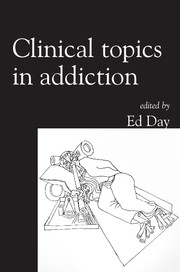Book contents
- Frontmatter
- Contents
- List of tables
- List of boxes
- List of figures
- List of contributors
- Foreword by Nat Wright
- Preface
- 1 What works in drug addiction?
- 2 The development of the drug treatment system in England
- 3 Stimulant use still going strong
- 4 Adverse effects of khat: a review
- 5 What the clinician needs to know about magic mushrooms
- 6 What works in alcohol use disorders?
- 7 Management of alcohol detoxification
- 8 Nicotine addiction and smoking cessation treatments
- 9 Pathological gambling: an overview of assessment and treatment
- 10 Use of investigations in the diagnosis and management of alcohol use disorders
- 11 Laboratory investigations for assessment and management of drug problems
- 12 Pharmacotherapy in dual diagnosis
- 13 Dual diagnosis: management within a psychosocial context
- 14 Treating depression complicated by substance misuse
- 15 Treating anxiety complicated by substance misuse
- 16 An overview of psychological interventions for addictive behaviours
- 17 Motivational interviewing
- 18 Substance misuse in adolescents
- 19 Management of drug misuse in pregnancy
- 20 Intoxication and legal defences
- 21 Substance misuse and violence: the scope and limitations of forensic psychiatry's role
- 22 Literary and biographical perspectives on substance use
- Index
13 - Dual diagnosis: management within a psychosocial context
Published online by Cambridge University Press: 02 January 2018
- Frontmatter
- Contents
- List of tables
- List of boxes
- List of figures
- List of contributors
- Foreword by Nat Wright
- Preface
- 1 What works in drug addiction?
- 2 The development of the drug treatment system in England
- 3 Stimulant use still going strong
- 4 Adverse effects of khat: a review
- 5 What the clinician needs to know about magic mushrooms
- 6 What works in alcohol use disorders?
- 7 Management of alcohol detoxification
- 8 Nicotine addiction and smoking cessation treatments
- 9 Pathological gambling: an overview of assessment and treatment
- 10 Use of investigations in the diagnosis and management of alcohol use disorders
- 11 Laboratory investigations for assessment and management of drug problems
- 12 Pharmacotherapy in dual diagnosis
- 13 Dual diagnosis: management within a psychosocial context
- 14 Treating depression complicated by substance misuse
- 15 Treating anxiety complicated by substance misuse
- 16 An overview of psychological interventions for addictive behaviours
- 17 Motivational interviewing
- 18 Substance misuse in adolescents
- 19 Management of drug misuse in pregnancy
- 20 Intoxication and legal defences
- 21 Substance misuse and violence: the scope and limitations of forensic psychiatry's role
- 22 Literary and biographical perspectives on substance use
- Index
Summary
Summary Recent developments in UK government policy have highlighted the unmet needs of people with dual diagnosis (comorbidity of substance misuse and psychiatric disorder, particularly severe mental illness). Advances in assessment techniques and diagnostic practice have informed the treatment of comorbidity and improved its outcome. There is growing evidence for the effectiveness of psychosocial interventions such as motivational interviewing and cognitive– behavioural therapy, mostly from US studies. However, within the secondary care provided by addiction and general psychiatric services there are serious implementation barriers related to service organisation, staffing levels, training and – most importantly – the difficulties of engaging people with severe mental illness and comorbid substance misuse in treatment. The evidence for the effectiveness of psychosocial treatments and models of service is reviewed and challenges for optimal practice in the UK are highlighted.
The co-occurrence of substance misuse with other psychiatric disorders is increasingly recognised as a major public health problem. The term ‘dual diagnosis’ has been introduced to describe this phenomenon, but ‘comorbidity’ might be a better term. Community-based surveys in the USA and the UK have reported high rates of comorbidity, particularly in people with serious mental illness (Harrison & Abou-Saleh, 2002). Farrell et al (2001), in a national household survey, reported prevalence rates of psychiatric disorder of 22% in nicotine dependence, 30% in alcohol dependence and 45% in drug dependence, compared with 12% prevalence in the non-dependent population.
The pattern of this comorbidity varies between comorbid mood, anxiety and personality disorders in patients accessing addiction services, and comorbid alcohol, cannabis and cocaine misuse in patients accessing general psychiatric services (Abou-Saleh, 2000). Comorbidity is associated with increased risk of violence, suicide and worse clinical and social outcomes. The National Confidential Inquiry into Suicide and Homicide has reported substance misuse as a factor in over half of homicides and suicides by people with serious mental illness (Department of Health, 2001). Moreover, people with comorbidity have high rates of criminality and blood-borne infections, including HIV infection and hepatitis B and C.
The severity of this morbidity also varies between these specialist settings: severe psychiatric disorder is associated with non-dependent use of substances (problematic substance misuse), whereas severe addiction is associated with personality disorder with or without minor psychiatric disorder.
- Type
- Chapter
- Information
- Clinical Topics in Addiction , pp. 169 - 183Publisher: Royal College of PsychiatristsPrint publication year: 2007

